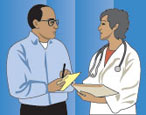| What are
side effects? | Side effects are problems caused by cancer treatment. Some
common side effects from chemotherapy are fatigue, nausea,
vomiting, decreased blood cell counts, hair loss, mouth sores,
and pain.
|
|
| What causes
side effects? | Chemotherapy is designed to kill fast-growing cancer cells.
But it can also affect healthy cells that grow quickly. These
include cells that line your mouth and intestines, cells in your
bone marrow that make blood cells, and cells that make your
hair grow. Chemotherapy causes side effects when it harms
these healthy cells.
|
|
| Will I get side
effects from
chemotherapy? | You may have a lot of side effects, some, or none at all. This
depends on the type and amount of chemotherapy you get and
how your body reacts. Before you start chemotherapy, talk with
your doctor or nurse about which side effects to expect.
|
|
| How long do
side effects last? | How long side effects last depends on your health and the kind
of chemotherapy you get. Most side effects go away after
chemotherapy is over. But sometimes it can take months or
even years for them to go away.
Sometimes, chemotherapy causes long-term side effects that do
not go away. These may include damage to your heart, lungs,
nerves, kidneys, or reproductive organs. Some types of chemotherapy
may cause a second cancer years later. Ask your doctor or
nurse about your chance of having long-term side effects.
|
|
What can be done
about side effects?

| Doctors have many ways to prevent or treat chemotherapy side
effects and help you heal after each treatment session. Talk with
your doctor or nurse about which ones to expect and what to do
about them. Make sure to let your doctor or nurse know about
any changes you notice - they may be signs of a side effect.
The chart called
Chemotherapy Side Effects At-A-Glance lists possible side effects and links to more information about each one.
|